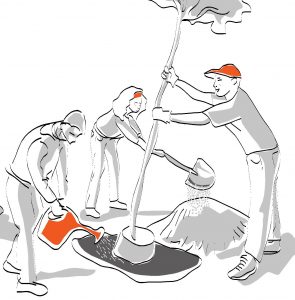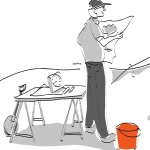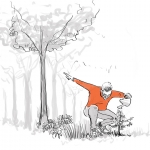Teamwork & Teambuilding Training
When you hand good people possibility, they do great things.

Self-organising teams are the new paradigm in organisational design. Be it in the framework of Agile management, the evolutionary organisation of Frederic Laloux or Brian Robertson’s Holocracy. The current trend clearly shows a path away from centralised and autocratic management systems towards more autonomy and responsibility for teams and it’s members.
Our teamwork & team building training starts out with building trust between team members and establishing a culture of communication and critical-constructive feedback right from the start. Only then we look at the characteristics and implications of team phases, the most common pitfalls of teamwork, the distribution of roles and responsibilities within teams or the development of high performance teams.
Objectives
Providing participants with the skills, knowledge and mindset to work in teams more effectively, understand the hidden dynamics behind behaviour in a group and develop them into high performance teams.
Specifically, after participating in this teamwork & teambuilding training, participants will be able to:
- Open up and set trust as the basis for solid teamwork
- Understand critics and conflict as a necessary and constructive element of teamwork
- Analyze and diagnose the development stage of their team(s)
- Analyze the distribution of roles and configuration of teams
- Understand and influence group dynamics in a constructive way
- Lead and coach the development of their team(s) towards high performance
Key Contents
Team diagnosis
- Teams vs. groups
- Phases of team development
- Belbin Team Roles
Team Development
- Leading team development
- 5 dysfunctions of teams and getting past them
- Team-coaching
- High performance teams
Group Dynamics
- Communication
- Cooperation vs. competition
- Conflicts
Methodology
Interactivity, active experience and learning by doing constitute the core methodology of this training course. The course will take a strong experiential approach offering every participant ample room and possibility to observe, analyze and improve his/her own teamwork. Every participant will assume different roles within a team, analyze and reflect on their implications and receive in-depth feedback on his/her performance. In practice this means the frequent use of practical exercises such as group dynamic activities role-plays and case studies. Theoretic knowledge will be introduced in parallel but always with the clear objective of increasing participant’s skills for observation, analysis and resulting action planning.
ATTENTION: The above described objectives, contents and methodology are just an example. All our trainings are custom tailored for our clients and adapted to organisation, objectives and participants’ profiles. Contact us to talk about your specific training needs!
Related Training Formats



